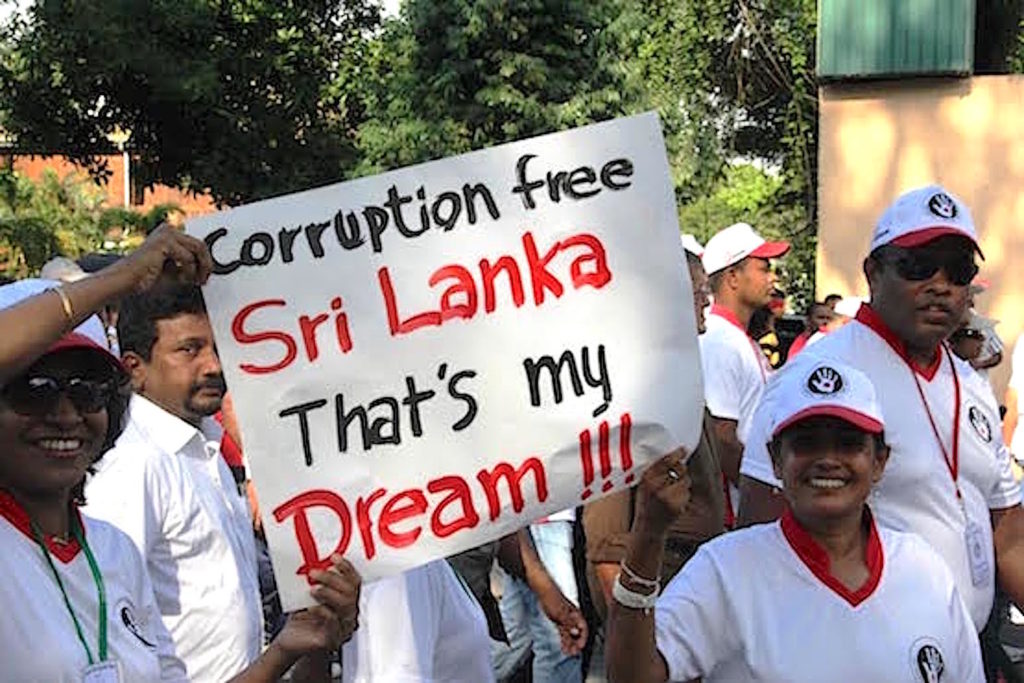Photo courtesy of UCA News
Today is International Anti-Corruption Day
There are actors, arrangements, acts, laws, regulations and institutions responsible for combating corruption. There are circulars issued on matters starting from admission to Grade 1 of a school to buying a ship or an airplane. Every successive government has added to the existing legal arrangements, legislation and institutional structure to ensure transparency, accountability and good governance. Parliamentary Committees, Presidential Commissions and Committees are being established. There are a host of agencies, courts, police, commissions and authorities. Opinion makers, whistle blowers, political parties, INGOs and national movements are abundant. Ours is the only country which elected a government of good governance.
But corruption is rampant and growing faster than the pace of anti-corruption institutions. The missing element in the equation is civil society and its inaction. When it comes to corruption we, as civil society members lament, curse, blame and call names. But feel that we are isolated, small, powerless, disorganised and unable to raise our voices or act against corruption.
Sri Lanka’s Supreme Court issued a symbolic ruling that two powerful presidents, a Finance Minister, two ministry secretaries and two Central Bank governors were guilty of mishandling the economy. The verdict was the result of two petitions filed by corruption watchdog Transparency International Sri Lanka (TISL) and civil society activists. This exhibits that civil society can and has a role to play against corruption committed by powerful people.
The importance of civil society
The contribution of Civil Society Organisations (CSOs) ranges from awareness raising to conducting prevention campaigns to participation in policy formation and monitoring of the implementation. CSOs are engaged in empowering citizens and exerting pressure on governments. Such interventions are crucial in a mission of combating corruption, for building capacity and supporting institutional reform.
There have been calls for strengthening the framework for participation of civil society. The right to civil society participation in policy making processes is recognised internationally.
- In 2014, UN Human Rights Council adopted a resolution stressing this issue and developed a study to highlight best practices and recommendations for further action. The study states that public participation includes the right to be consulted at each phase of legislative drafting and policy-making; to voice opinions and criticism; and to submit proposals aimed at improving the functioning and inclusivity of all state bodies.
- Civil society participation in public affairs is integrated into Article 25 of the International Covenant on Civil and Political Rights. OHCHR has issued implementation guidance for countries.
- 2030 Agenda for Sustainable Developmentrecognises that progress in promoting sustainable development requires strong partnerships across society. Goal 16 aligns with the broader human rights framework. The reduction of corruption and bribery (Goal 16.5) and the development of effective, accountable and transparent institutions (Goal 16.6) have been bundled with ensuring responsive, inclusive, participatory and representative decision making (Goal 16.7). Anti-corruption efforts cannot be successful without meaningful participation.
- The UN Convention against Corruption (UNCAC) has long recognised the role of civil society in combating corruption by calling on governments to increase transparency, improve public access to information and promote public contributions to government decision making processes.
- In the words of Peter Eigen, co-founder of Transparency International, “Only an effective coalition of state, business and civil society can bring transparency and accountability to governance – not only to fight corruption, but other ills of globalization too, including injustice and inequity, poverty, violence, conflict, environmental destruction and climate change.”
- The right for peaceful protest and freedom of expression is enshrined in the Constitution. Right to Information Act and the Anti-Corruption Act are parts and parcel of the Constitution.
Which side of the fence does civil society stand?
According to circulars issued on school admission, proof of residence within close proximity is well known. It is so well known that parents start preparing forged documents since the day a child is conceived. The result is passing bribes in cash, kind and sexual favours, depriving admission to genuine children residing within the approved limits. Does civil society stand with corruption or on the opposite of the fence?
I treat public sector employees as an integral part of civil society. They are educated, made people of worth with public funds. Their remuneration, cost of training and welfare before and after retirement is looked after by civil society. Their dedication, commitment and the service readiness matter a great deal. Public servants get various concessions and perks such as medical leave and free railway warrants. Public servants obtain medical leave on the pretext of being ill and take a holiday warrant and go to cool climes with the family on a holiday. Members of the public seeking his service are sent back empty handed.
Civil society is represented by 225 elected and nominated MPs. There are watchdog committees to inquire into irregular actions committed by public institutions. The Committee on Public Enterprises (COPE) and Committee on Public Accounts COPA) are prominent. We watch and read the proceedings of these committees but we are deprived of details after the COPE chairman sealed his lips with a finger.
Civil society is the loser of the intended benefit of a government policy and programme. There are news items about bad quality gas cylinders causing deaths and injuries to people. A school girl, after celebrating her sixth birthday, died when a wash basin fell on her. The basin was not properly fixed to the wall. Someone had pocketed a part of the money allocated by the ministry. People are at the receiving end of such tragedies caused by the corrupt actions of public servants.
With the lack of vigilance and being indifferent to corruption and governance, civil society stands on both sides of the fence. We are running with the hare and hunting with the hounds.
